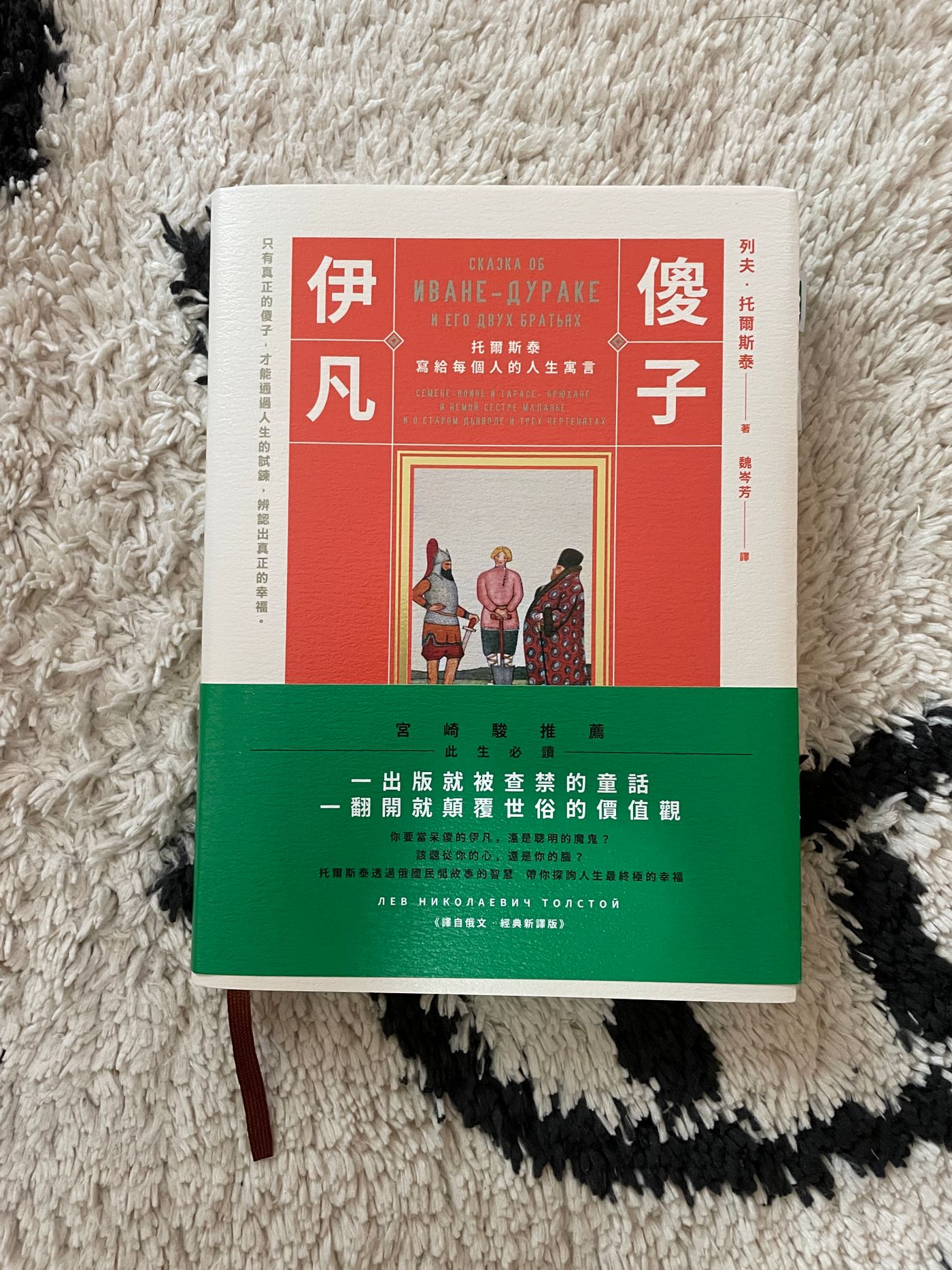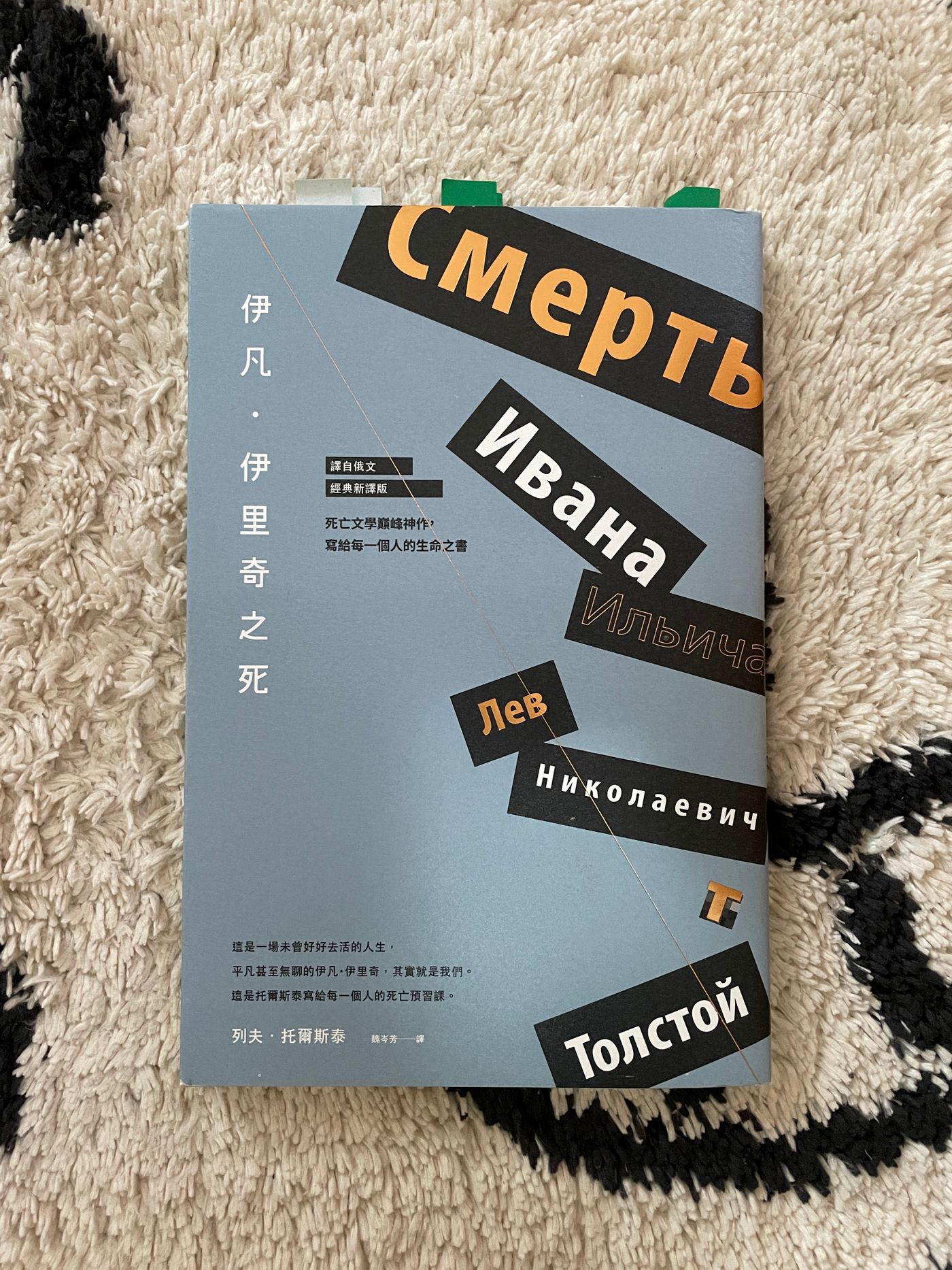Ivan vs Ivan
Some people say that 2021 is the first year of independent bookstores in Hong Kong, and many independent bookstores have opened in just over a year. The manager of each independent bookstore has a different selection of books, which will undoubtedly broaden my reading horizons, such as Camus' "Caligula", "Misunderstanding", "The Righteous", "The Stranger"; Ward Six", "The Seagull", "Uncle Vanya"; Joyce's "Dubliners", etc., and of course Hong Kong literature. To be honest, without an independent bookstore, maybe I'm still reading speculative fiction, architectural design, and a small amount of literature. The books introduced this time are all bought and read because of the selection of books by independent bookstores. What's more interesting is that they are all from the same writer: Leo Tolstoy's works - "Ivan the Fool" and "The Death of Ivan Ilyich".
When I mention Tolstoy, I will only think of him as a great Russian writer whose famous work is War and Peace. No matter how you can guess, there are the above two works, and one of them is recommended by Hayao Miyazaki, saying that it is a "must read in this life". I didn't even expect that the two books were published in the same year in 1885, and the styles of the two books are completely different.
"Ivan the Fool" tells the story of three brothers facing an old devil and three little devils. Ivan's two older brothers, one is a soldier and the other is a businessman. And Ivan was called a "fool" since he was a child. He was a farmer and took care of his dumb sister. The three brothers love each other, and even the family is separated in harmony. One day, the old devil asked three little devils to deal with the three brothers, and asked them to quarrel. The two brothers were vulnerable, and Ivan not only defeated the three little devils, but even the old devil surrendered in the end.
The whole story carries a message: those who work with their hands and the land are the ones to be praised, don't use force or buy and sell like Ivan's two older brothers, because the result is failure. In Ivan's kingdom:
There is only one custom: only people with calluses on their hands can eat at the table, and if they don't have calluses, they can only eat leftovers. (page 145)
I think this is Tolstoy's ideal country - celebrating every hard worker.
On the other hand, while the whole story says that Ivan is a fool, he is not stupid at all. In the middle of the story, when the eldest brother asked Ivan for the stalks with magic that could be turned into soldiers, Ivan refused, because he knew that the elder brother used it to do evil, robbing and destroying land and agricultural products. Rather than calling Ivan "stupid," it would be better to say that he was "good and stubborn"—he was just following the teachings he was taught at a young age about the basic values of being a human being. As the introduction says:
What Ivan follows is actually what many people will be taught in childhood, about the basic values of being a human being, but in the process of growing up, the reality often distorts these values, and those who stick to the original teachings are regarded as Invariable or ignorant, that is to say, the protagonist Ivan in "Ivan the Fool" is not really stupid or stupid, he just believes in those basic values. What Tolstoy said was not exactly a fable of "a fool has a foolish blessing", but a story of "adherence to good values will eventually overcome skewness". (page 32)
Ivan the Fool is a lighthearted allegory, but the other book, The Death of Ivan Ilyich, is the exact opposite.
The story tells the story of an ordinary person, Ivan, who starts from a low level and rises to the position of a judge step by step, so that his family can live a happy life. He thought that this kind of life would go on forever, how could he know that one day, when he found out that he was ill, he would drag his life into darkness until he died.
What Tolstoy wrote about is that it is when man faces death that he discovers/understands what life is all about. Maybe you think, this is what everyone faces, what's so special about it? I think there are very few such works in the current generation, so that it becomes one of the classics. Tolstoy used the first body to write about a person's state of facing death. When Ivan learns that he is ill, he falls into a haze of death:
"I'm gone, so what else? There's nothing. So when I'm gone, I'll be there again? Is it death? No, I don't want to die." He jumped up, trying to light the candle, he After groping for a while with trembling hands, he knocked the candle together with the candlestick to the ground, and fell on the pillow again. "Why? It doesn't matter," he said to himself with his eyes open in the darkness. "Death. Yes, death. And they don't know anyone, don't want to know, don't feel bad. They're playing cards. . . . It doesn't matter, but they also die. These idiots. It's just that I'm earlier, they're later; death will come to them as well. They're still happy. These beasts!" He began to suffer unbearably, the pain was unbearable. Not everyone is destined to suffer from this fear. … (page 72)
Because the patient/death is "personal", people other than the patient cannot fully understand it, even the family members around the patient. Ivan's feeling is that no one cares about his situation. However, as his condition got worse, he began to feel that his family, friends, and doctors around him were deceiving him:
For Ivan Ilyich, the greatest pain was the lie - everyone lied to him for some reason, that he was only ill, not to die, just keep calm, heal well, and then there will be good news . He clearly knew, including himself - that he was in a bad condition, he wanted to lie to him, and he also forced him to join the scam. A lie, a lie that was made up before death, belittles the solemn, terrible death, making it tantamount to all the visits, the curtains, the trout for lunch... It made Ivan Ilyich very uncomfortable. (page 87)
I probably understand Ivan's feelings. As relatives and friends, they will naturally say good things. Only those who are sick can know what their situation is. However, when I was in such a depressed state, my body seemed to also receive this message, and there was no fighting spirit, and it went from bad to worse. I remember my uncle, when he found out that he had stage 4 cancer, he completely gave up his motivation to live. It only took two months from being admitted to the hospital to his death. I understand that he feels he has enough and doesn't want to affect his family, and his body is clearly "cooperating" with his will. His attitude towards death is very different from Ivan.
Is the sense of death an "experience"? Did Tolstoy write about the experience of death? Teacher Yang Zhao mentioned in "The Pursuit of Ultimate Youth: Yang Zhao Talks About Yukio Mishima" that the Western philosopher Wittgenstein said:
"Death is not human experience." Experience and death are the opposite, one has to live to have experience, but the definition of death is the cessation of experience, so one cannot experience death. Evelgenstein's reminder: If someone tries to talk about death in terms of experience, it must be false. People can think about death, can guess death, but have no chance, any possibility to experience death.
According to Wittgenstein, Tolstoy did not focus on the moment of death, but wrote about how ordinary people face death when they suddenly fell ill at the peak of their lives: what awaits him is no longer prosperity and wealth. , but endless darkness.
Writing here, I think of the last paragraph of Teacher Long Yingtai's "Mountain Road" [Note 1]:
Some things can only be done by one person. Some levels can only be passed by one person. Some roads can only be walked alone.
Death, you have to go alone; facing death, too, is a personal matter.
~~~~~~~~~~~~~~~~~~~~~~~~~~~~~~~
[Note 1] <Mountain Road>
https://kknews.cc/zh-hk/essay/eyj9zvy.html
"Ivan the Fool" (from the blog) —
https://www.books.com.tw/products/0010811629
The Death of Ivan Ilyich (from blog)—
https://www.books.com.tw/products/0010783303



Like my work? Don't forget to support and clap, let me know that you are with me on the road of creation. Keep this enthusiasm together!
